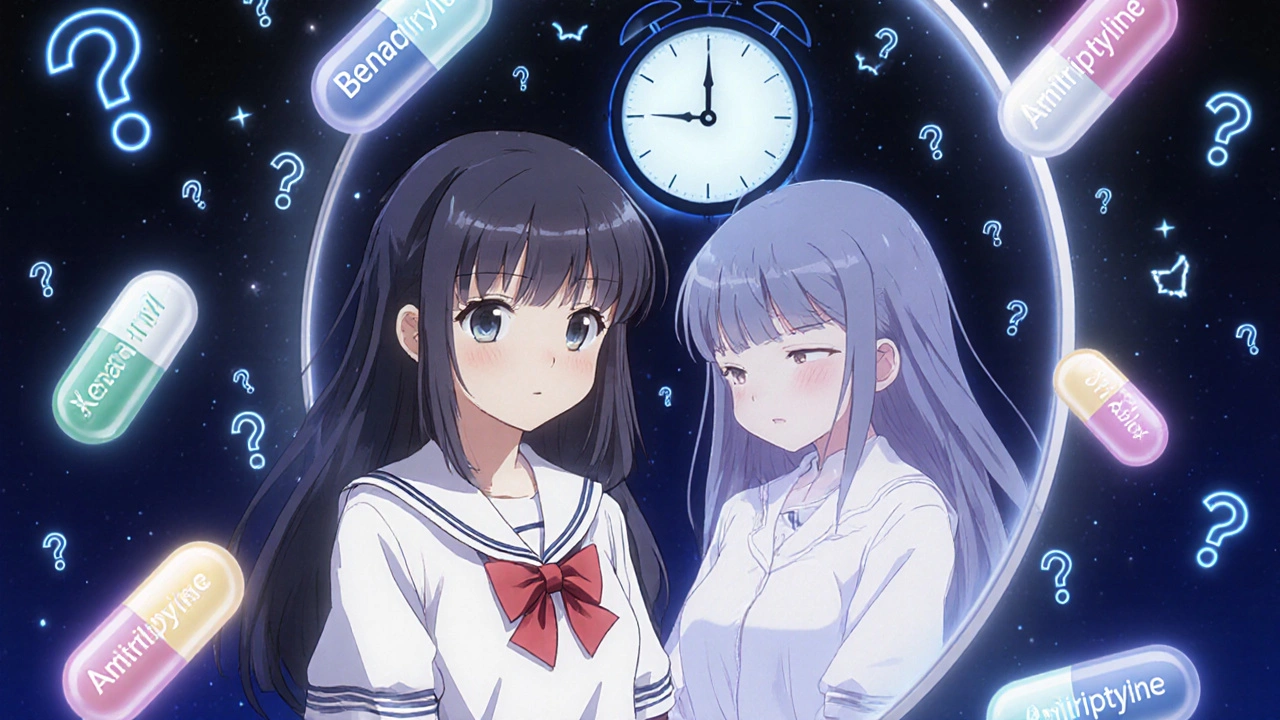Medication Drowsiness Checker
How It Works
This tool analyzes your medication against common drugs known to cause drowsiness. It provides:
- Drowsiness risk level
- Management strategies
- Non-sedating alternatives
Medication Analysis
Medication:
Risk Level:
Management Tips
Non-Sedating Alternatives
Ever take a pill and feel like you’re dragging through molasses by noon? You’re not alone. About 15-20% of adults in the U.S. report excessive drowsiness caused by their medications - and many don’t even realize it’s the drug, not their lifestyle, that’s to blame. This isn’t just about feeling sleepy. It’s about falling asleep at your desk, nearly crashing your car, or tripping on the stairs because your body’s too heavy to move. Medication-induced drowsiness is real, common, and often preventable - if you know what to look for.
What’s Really Causing Your Sleepiness?
It’s not just caffeine withdrawal or bad sleep. Certain medications directly slow down your central nervous system (CNS), making you feel foggy, slow, or like you’ve been hit with a sandbag. The most common culprits fall into a few clear categories.- Antihistamines: Even over-the-counter ones like diphenhydramine (Benadryl) or hydroxyzine (Vistaril) can knock you out. Up to 70% of people who take first-gen antihistamines report heavy drowsiness. That’s why you see "may cause drowsiness" on allergy meds - it’s not a warning, it’s a guarantee for many.
- Tricyclic antidepressants: Drugs like amitriptyline and doxepin are great for chronic pain and depression, but they come with a side effect most people don’t expect: all-day fatigue. Around 30-40% of users say they feel like they’re running on empty, even after a full night’s sleep.
- Benzodiazepines: Xanax, Valium, Klonopin - these are prescribed for anxiety and insomnia, but they can make you feel groggy for hours, sometimes days. And if you’re taking them with anything else that slows your brain - like opioids - the risk of breathing problems or even death goes up sharply. The CDC recorded over 16,700 overdose deaths in 2021 from this exact combo.
- Beta-blockers: Used for high blood pressure and heart conditions, drugs like metoprolol and propranolol can cause tiredness by slowing your heart rate. It’s not everyone, but 10-15% of users report constant low energy.
- Opioids, muscle relaxants, and anticonvulsants: Oxycodone, cyclobenzaprine, gabapentin - all can add a heavy layer of sleepiness on top of your existing symptoms.
Here’s the kicker: many people don’t connect the dots. A 2023 patient behavior study found that most people wait an average of 4.2 months before realizing their fatigue is drug-related. By then, they’ve missed work, skipped family events, or even had a close call driving.
Why Some People Are More Affected Than Others
Not everyone who takes amitriptyline feels like a zombie. Some people barely notice it. Why? It comes down to biology.Your liver enzymes, age, weight, and even your genes play a role. Older adults are especially vulnerable - 34% of medications commonly prescribed to seniors cause drowsiness, according to the American Geriatrics Society. That’s why falls in elderly patients are so common. One study found medication-induced sleepiness contributes to 20-30% of all falls in people over 65.
There’s also the issue of drug interactions. Taking two or more CNS depressants - say, a sleeping pill and a muscle relaxant - multiplies the effect. It’s not additive; it’s exponential. That’s why the FDA now requires black box warnings on opioid and benzodiazepine labels: together, they can shut down your breathing.
And don’t forget alcohol. Even one drink can turn a mild side effect into a dangerous one. Same goes for dehydration. When you’re low on fluids, your body processes meds slower, and the drowsiness gets worse.
What You Can Do Right Now
The good news? You don’t have to live with this. There are real, practical steps you can take - without quitting your meds cold turkey.- Take your meds at night: This is the single most effective trick. If you’re on a drowsiness-causing drug like amitriptyline, hydroxyzine, or a benzodiazepine, ask your doctor if you can switch from morning to bedtime dosing. Studies show this simple change reduces daytime sleepiness by 50-70% in over 80% of people who try it.
- Swap to non-sedating versions: For allergies, switch from diphenhydramine to loratadine (Claritin) or cetirizine (Zyrtec). For depression, talk to your doctor about switching from a tricyclic to an SSRI like sertraline or escitalopram - they’re far less likely to make you tired. In fact, second-gen antihistamines now make up 78% of the allergy med market because they work without the sleepiness.
- Move your body: Light exercise - even a 20-minute walk - boosts alertness better than caffeine for many people. It doesn’t have to be intense. Just get your blood flowing. One study showed combining daily walking with better sleep hygiene improved fatigue scores by 30-40%.
- Watch your caffeine: It might seem like a fix, but caffeine after noon can wreck your sleep, making the next day’s drowsiness worse. If you’re already tired from meds, poor sleep just feeds the cycle.
- Stay hydrated: Dehydration makes drowsiness worse. Drink water consistently through the day. Don’t wait until you’re thirsty.

When to Talk to Your Doctor - And What Not to Do
Don’t stop your meds on your own. That’s dangerous. Suddenly quitting benzodiazepines can trigger seizures. Stopping antidepressants like amitriptyline can cause serotonin syndrome - a potentially deadly condition. About 15-20% of people who quit these drugs abruptly experience serious withdrawal symptoms.Instead, keep a symptom journal. Note when you feel sleepy, how bad it is, and what meds you took. Bring it to your doctor. Ask:
- "Is this drowsiness a known side effect of this drug?"
- "Is there a non-sedating alternative?"
- "Can I switch the timing of this dose?"
- "Could another medication I’m taking be making this worse?"
Some patients have found relief just by switching from propranolol to nebivolol - a beta-blocker that’s less likely to cause fatigue. Others swapped hydroxyzine for a nasal spray or allergy shots. Small changes, big results.
New Tools and Future Options
The field is evolving. In 2023, the FDA approved solriamfetol (Sunosi) for sleep disorders like narcolepsy - and doctors are now using it off-label for medication-induced drowsiness in patients who don’t respond to other fixes.Genetic testing is also emerging. Companies like GeneSight offer tests that analyze how your body metabolizes drugs. In early trials, patients who used these tests had 35% fewer side effects, including drowsiness. It’s not yet standard care, but it’s a sign of where things are headed.
Meanwhile, AI-powered apps that track your meds and alert you to interactions are gaining traction. One prediction says they could cut drowsiness-related incidents by 25% by 2027. But the CDC still says the best tool? Patient education. Their 2022 study found that people who got clear counseling about side effects had 40% fewer ER visits related to drowsiness.

Bottom Line: You Don’t Have to Just Live With It
Medication-induced drowsiness isn’t something you have to shrug off. It’s a side effect - not a normal part of treatment. Millions of people are managing it successfully by making small, smart changes: timing their pills, swapping drugs, moving more, and talking to their doctors.If you’re tired all the time and you’re on meds, it’s time to ask: is this the drug - or is it me? The answer matters. Because feeling alert isn’t a luxury. It’s a necessity for safety, for work, for life.
Can over-the-counter allergy meds really make you this sleepy?
Yes. First-generation antihistamines like diphenhydramine (Benadryl) and hydroxyzine (Vistaril) cross the blood-brain barrier and directly cause drowsiness in 50-70% of users. Even if you don’t feel it right away, your reaction time, memory, and alertness are impaired. Switching to second-generation options like loratadine (Claritin) or cetirizine (Zyrtec) cuts this risk dramatically - they’re designed to stay out of the brain.
Is it safe to drink coffee to fight medication drowsiness?
Caffeine can help temporarily, but it’s not a long-term solution. If you drink coffee after noon, it can interfere with nighttime sleep, which makes daytime tiredness worse. Over time, you might end up needing more caffeine just to stay awake - creating a cycle. Better to fix the root cause: timing your meds or switching to a non-sedating version.
Why does my doctor say not to stop my antidepressant even if I’m tired all day?
Stopping antidepressants like amitriptyline suddenly can cause serious withdrawal symptoms - including anxiety, nausea, dizziness, and even seizures. About 15-20% of people who quit cold turkey experience these effects. Instead, talk to your doctor about lowering the dose slowly or switching to a less sedating drug like sertraline or fluoxetine. You can manage the fatigue without risking your mental health.
Can drowsiness from meds get worse over time?
For most people, drowsiness improves after 2-4 weeks as the body adjusts. But for some drugs - like tricyclic antidepressants or certain beta-blockers - fatigue can persist. If your tiredness doesn’t improve after a month, or gets worse, it’s not normal. That’s a sign you need to revisit your treatment plan with your doctor.
Are there any natural remedies that help with medication-induced drowsiness?
There’s no proven herbal fix, but lifestyle changes help. Getting 7-8 hours of sleep every night, walking daily, staying hydrated, and avoiding alcohol can reduce drowsiness by 30-40%. Some people find bright light exposure in the morning helps reset their body clock. But nothing replaces adjusting your meds under medical supervision.
How do I know if my drowsiness is from meds or something else?
Track your symptoms. Write down when you feel sleepy, what meds you took, and what time of day. If the drowsiness starts or worsens after beginning a new drug, and improves when you stop it (under doctor supervision), it’s likely the medication. If you’re also snoring, waking up gasping, or feel unrefreshed after sleep, sleep apnea could be involved. A doctor can help you tell the difference.

 Pharmacology
Pharmacology
Georgia Green
November 17, 2025 AT 02:26i took benadryl for allergies last week and nearly fell asleep at my kid's soccer game. like... i was just sitting there and my head nodded forward and i woke up with drool on my shirt. never again. switched to claritin and now i'm actually awake during daylight hours. why do they even sell the sleepy ones if they're basically sedatives?
Christina Abellar
November 18, 2025 AT 14:26Great post. I appreciate how you laid out the alternatives. Small changes can make a huge difference.
Eva Vega
November 20, 2025 AT 07:49Pharmacodynamically, the first-generation H1 antagonists exhibit significant CNS penetration due to their lipophilicity and lack of P-glycoprotein efflux, which correlates directly with increased sedative burden. Second-generation agents like loratadine demonstrate negligible blood-brain barrier permeability, thereby mitigating these adverse effects.
Matt Wells
November 21, 2025 AT 03:15It is unfortunate that such a well-researched and meticulously structured article is buried beneath the noise of anecdotal Reddit commentary. The data presented here should be disseminated through medical journals, not social media threads.
Peter Stephen .O
November 23, 2025 AT 00:45Bro. I was a zombie on amitriptyline. Like, I'd stare at my coffee for 10 minutes wondering why it wasn't moving. Switched to sertraline? Boom. Back to human. Also, walking after dinner? Game changer. Don't sleep right after eating. Your body thinks it's hibernating.
Andrew Cairney
November 23, 2025 AT 05:28They don't want you awake. Big Pharma knows if you're alert, you'll notice they're selling you poison. That's why they keep putting diphenhydramine in everything. Even the 'non-drowsy' ones have a hidden trigger. Check the ingredients. Look at the fine print. They're watching your sleep patterns. I'm not crazy. I've seen the charts.
Rob Goldstein
November 24, 2025 AT 02:46For those on beta-blockers: if you're feeling sluggish, ask about nebivolol. It’s a nitric oxide-enhancing agent with less fatigue risk. Also, hydration isn't just water - electrolytes matter. Try adding a pinch of sea salt to your water. Small tweak, big difference in energy.
vinod mali
November 24, 2025 AT 04:49i take gabapentin for nerve pain. used to sleep all day. switched to night dose. now i’m fine. just ask your doc. no big drama. simple fix.
Jennie Zhu
November 25, 2025 AT 09:48It is imperative that patients be made aware of the pharmacokinetic and pharmacodynamic profiles of their prescribed regimens. The underreporting of sedative side effects remains a significant clinical oversight, particularly among geriatric populations where polypharmacy is prevalent.
Kathy Grant
November 25, 2025 AT 12:03There’s something haunting about how we’ve normalized feeling like a ghost in our own bodies. We take these pills, and we don’t even question why we’re dragging through the day like a shadow. We think it’s just life. But it’s not. It’s a signal. A whisper from your body saying: "This isn’t me. This isn’t right." And sometimes, the bravest thing you can do is ask your doctor: "Can we try something else?"
Robert Merril
November 27, 2025 AT 10:16benadryl is just liquid sedation with a label. i took it for a cold and slept for 14 hours. woke up like i got hit by a truck. also i spelled sleepy wrong on purpose. sue me
Noel Molina Mattinez
November 28, 2025 AT 17:25you know what else makes you tired? your job. your kids. your bills. not the meds. stop blaming pills for your lazy life
Roberta Colombin
November 30, 2025 AT 03:59I’m from Colombia, and here we don’t have access to many of these newer meds. But the advice about timing pills at night and staying hydrated? That’s universal. I shared this with my uncle in Medellín. He switched his blood pressure pill to bedtime and now he plays dominoes without napping. Small change. Big joy.
Dave Feland
December 1, 2025 AT 03:16Of course the FDA approves solriamfetol - it’s patented by a subsidiary of a pharmaceutical conglomerate with ties to the Defense Department. The real solution? Eliminate all CNS depressants. They’re designed to keep the population docile. Wake up.
Ashley Unknown
December 1, 2025 AT 19:30I’ve been on 17 different meds in the last 5 years and every single one made me feel like I was underwater. I stopped them all. Now I’m on a raw vegan diet, drink moonwater, and only take magnesium under the full moon. My doctor says I’m delusional. I say she’s part of the system. Last week I didn’t sleep for 72 hours and I felt more alive than ever. The drowsiness? It was the government. Or the aliens. Or both. I recorded the dreams. They showed me the truth. You think you’re tired because of pills? No. You’re tired because they don’t want you to see.
Rob Goldstein
December 2, 2025 AT 23:01Just a heads-up - if you're on gabapentin and start feeling foggy, check if you're also taking a benzo or opioid. That combo is a silent killer. I lost a friend to it. Not because he overdosed - because he just... stopped waking up. Talk to your pharmacist before mixing anything.